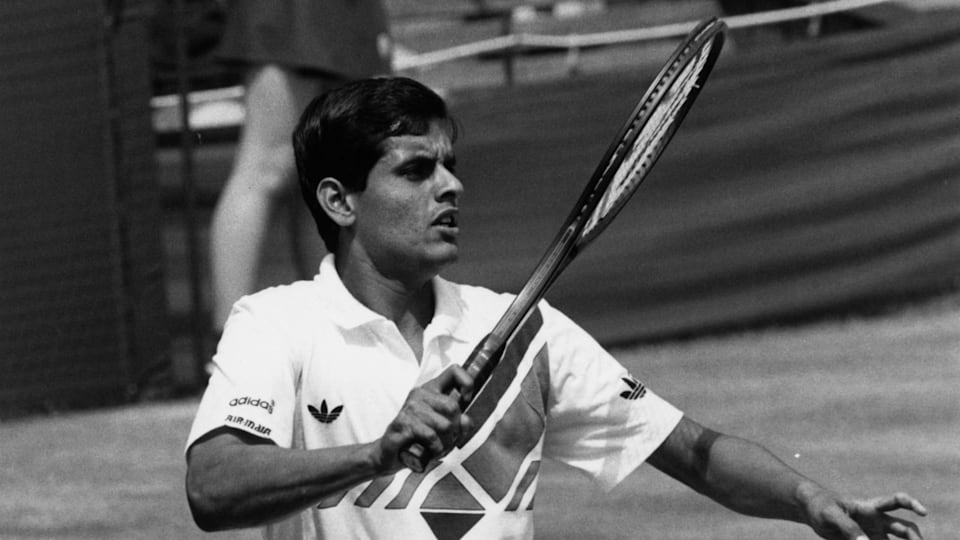Down the memory lane: When India's Ramesh Krishnan toppled the World No. 1 at the Australian Open
In 1989, Krishnan entered the annals of Indian tennis history as he defeated defending champion Mats Wilander at the Australian Open

Upset, shocked, humbled. There were a few different ways the world media relayed the news of World No. 1 Mats Wilander, who had won three of the last four Slams, crashing out of the 1989 Australian Open. At the centre of the stunning result was an unassuming Indian with an exquisite game: Ramesh Krishnan.
Using a wicked mix of volleys and lobs, the unseeded Krishnan outsmarted Wilander for a 6-3, 6-2, 7-6 win in the second round of the Australian Open. It remains the only occasion when an Indian player got the better of a reigning World No 1 at a major.
The two players had clashed seven times before the Australian Open second round in 1989, with Wilander winning six of those matches. In 1987, Wilander and Krishnan had been the No 1 players for their respective teams when Sweden and India contested for the Davis Cup title. But the Swede had quashed all hopes of resistance as he defeated Krishnan 6-4, 6-1, 6-3 on indoor clay at Gothenburg.
In 1988, Wilander had emerged as the most dominant force on the men’s tour winning three Grand Slam titles: the Australian Open, the French Open and the US Open. A master of playing the percentages much like his predecessor Bjorn Borg, the Swede looked poised to extend his reign into the next season.
The first signs of trouble came in the opening round at the Australian Open. The 24-year-old was taken to five sets by fellow Swede Tobias Svantesson before he scraped through 6-3, 2-6, 7-5, 5-7, 6-3.
But there was no escaping the alluring traps set by Krishnan. Though he didn’t have the biggest serve or the most powerful shots, the Indian, ranked 51 in the world then, weaved a web with his silky strokes. He would sneak up to the net and then finish off the point with a delectable volley.
Krishnan’s relentless aggression won the day against seven-time major champion Wilander at the Australian Open.
“It was the highest point of my career and one of those matches where I played to my potential. It was a great victory because I was coming from an injury lay-off. The crowd was amazing and it pumped me up. A light drizzle almost came to Wilander’s rescue when I was leading 1-0, 40-0 in the second set, but officials turned down his request for play to be halted." - Ramesh Krishnan recalling his win in 2014
Though Krishnan had dominated the match from the get-go, he started feeling the pressure as he neared the finish line. Down 3-5 in the third set, Wilander conjured the beginnings of a comeback with a cross-court pass in the ninth game to save the first match point at 30-40. The Swede then broke Krishnan’s serve to level the set at 5-5 before it went into a tie-breaker.
“I broke my racquet while serving during the tie-breaker and I was up 5-4 then,” Krishnan was quoted saying. “I was nervous and made a double-fault to make it 5-5. I earned my fourth match point with a forehand volley.”
He punched a backhand cross-court volley out of Wilander’s reach to seal a famous win. He had become the first man since Germany's Karl Meiler, in 1973, to stop a defending champion from advancing in the second round.
One of the highlights of Krishnan’s career, the match seemed to have pushed the Swede off the edge.
“Mentally I just wasn't in the match. He never let up and didn't make any mistakes. It has been difficult for me to motivate myself since the US Open. That was such a big thing for me. Maybe being number one has got to me, because from there you can only go down.” - Mats Wilander after the match
It was almost like the Swede was foretelling his decline: he didn’t win a single Grand Slam title after that loss. His best result in a Grand Slam was a semi-final finish at the 1990 Australian Open before he retired in 1996.
For Krishnan, who had made the last eight at Grand Slam on three previous occasions, the win over Wilander further cemented his place in the annals of Indian tennis history.
